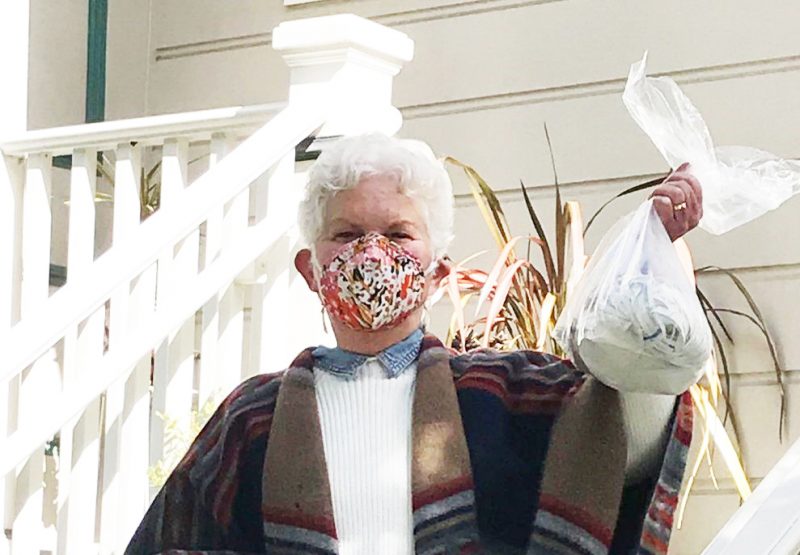Before the pandemic, Joan Lasselle, 74, was enjoying the life of the recently retired. “People would just reach out to me and ask if I would be interested in volunteering. The thing about retirement is when things come along, I can say ‘yes’ instead of ‘no.’”
Forty years after founding and being CEO of Lasselle-Ramsay, a company providing Silicon Valley clients with content for sales and support of high tech and medical devices, she decided it was time to pursue the interests she had left behind.
Documentary filmmaking was one of them. When she met a young, San Francisco State University filmmaker needed a gofer, she volunteered. She handled emails, researched film festivals, helped with fundraising and feedback on rough cut screenings. The film, Objector, about a young Israeli woman who refuses military duty and is imprisoned for her dissent, is now on the film circuit with Lasselle listed as an associate producer.
Community to the rescue
Then came the pandemic and in-person activities shut down. So Lasselle was at the ready when a friend recruited her to help make masks. East Bay entrepreneur Shelley Wong had heard from some emergency room doctors that they didn’t have enough. She, Lasselle and other friends hoped to “maybe sew 1,000 masks,” she said. Inspired by the African proverb, they called themselves It Takes a Village.
“It was the community coming together to support the community. We were in shut down, people had time on their hands and wanted to help,” Lasselle said. “We accepted all volunteers and became a multi-generational group that included grandparents, parents and teens.”
Lasselle was born and raised in Tigard, Ore., outside Portland, and earned a master’s degree in education from the University of Oregon. She married and has one daughter, who lives in Los Angeles. As a classroom teacher in Menlo Park, in the heart of Silicon Valley, she was quickly introduced to the emerging personal computer industry.
The mask makers’ leadership team brought their business skills to the new venture, taking it from a handful of friends making 1,000 fabric masks to a team that has delivered 170,000 plus pieces of PPE, including face shields and refurbished N95 masks. “We weren’t interested in creating a new nonprofit. We just wanted to step in and resolve an immediate need.”
Lasselle and Wong worked together to find recipients for the masks in the Bay Area. Their initial focus was safety-net hospitals, those that provide healthcare regardless of a patient’s insurance status or ability to pay. The hospitals often helped identify other organizations supporting underserved communities who needed masks.
“We went top-down,” she said, “the larger institutions could introduce us to the groups they worked with, which made it easy to get to the right people.”
Major donations were made to more than 100 different organizations in the Bay Area, including Alameda Health Systems, UCSF Zuckerberg, San Francisco General, UCSF Hospital, San Mateo County Health, Contra Costa Health and the Valley Medical Center Foundation. Others who received donations include community health centers, St. Anthony’s Kitchen, Downtown Streets Team, and First Five Oakland/San Francisco/Santa Clara. While the focus has always been local, ITAV also donated to the Navajo Nation and hospitals and clinics in New York and New Jersey.
Scaling up
There was “a real need but it was also a lot of fun,” said Lasselle. “It was an extraordinary time. People were not distracted by work and vacations. They really wanted to protect each other.”
Some 400 volunteers stepped up in one way or another. Berkeley’s Bryn Walker donated fabric. The Grand Hyatt SFO donated sheets and linens for liners. Boy Scouts and high school students assembled face shields; and hundreds of neighbors cut, sewed, washed, ironed, sorted, and delivered the goods. TMC Community Capital in Oakland served as the fiscal sponsor and a GoFundMe plea raised additional funds for the purchase of material, face shields and other costs.
“If It Takes a Village has been successful,” Lasselle said, “it’s because people from all walks of life, multi-generations, and different communities all have come together to address as immediate need. People working together to do good.”
Volunteers were organized into neighborhood hubs. Lasselle, a Glen Park resident, recruited her neighbors as “sewists,” (her term). Some were friends she knew before the pandemic, others she met through referrals and posts on the NextDoor message platform. “It was a great way to connect with some wonderful people in the neighborhood.”
She delivered sewing kits and picked up the completed masks. “If someone ran out of thread, I picked it up for them. They put in a tremendous number of hours, and we wanted them to have a positive experience and know they were appreciated.”
Frequent ITAV newsletters and zoom meetings helped fill the void of in-person meetings. “It was a labor of love,” said Cynthia Dragon, one of Lasselle’s army of sewists.
Now that the panic of the earlier months has lessened and hospital staff are largely protected, ITAV is focused on schools re-opening in August.
“We don’t really know how much longer we’ll keep going,” said Lasselle. “We’re still donating to organizations that support populations like the homeless that have not been vaccinated, but some of our volunteers have returned to work.
“With the Delta and other variants increasing the demand for protective equipment, we need more volunteers.” Lasselle asks those interested in volunteering to contact her at joan.lasselle@gmail.com.

